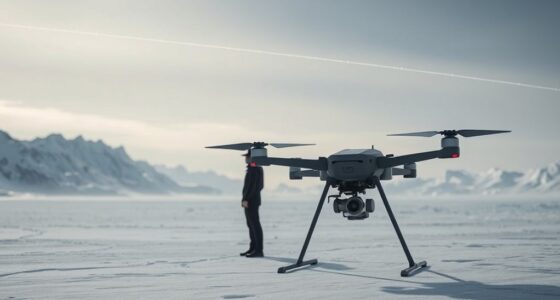The CIA and NSA are both embracing AI to enhance their intelligence operations but in unique ways. The CIA focuses on innovative initiatives, using AI for content analysis and collaboration with private sector partners. The NSA, on the other hand, prioritizes cybersecurity and protects its AI systems through its AI Security Center. These different approaches reflect their distinct missions and challenges. Keep exploring to discover how these agencies are navigating the complex landscape of AI and national security.
Key Takeaways
- The CIA pioneers innovative AI initiatives to enhance intelligence operations, focusing on open-source analysis and predictive capabilities through tools like OSIRIS.
- The NSA utilizes AI primarily for mass surveillance and data analysis, ensuring robust security through its AI Security Center against evolving threats.
- Both agencies prioritize ethical governance in AI use, with the CIA emphasizing bias-free applications and the NSA addressing security challenges related to AI systems.
- The CIA collaborates with private sector partners to develop AI talent, while the NSA works with industry experts to safeguard AI from malicious attacks.
- National security directives drive rapid AI adoption in both agencies, highlighting the urgency of enhancing capabilities to counter advanced threats.
AI Adoption in Intelligence Agencies

As intelligence agencies increasingly recognize the transformative potential of artificial intelligence, they're taking significant steps to integrate AI into their operations.
The FBI's established AI policy and Ethics Council guide its efforts, but funding and hiring challenges slow progress.
Meanwhile, the DEA relies on partner agencies for AI tools, grappling with expansion issues.
The NSA stands out as a leader, utilizing AI for mass surveillance and data analysis effectively.
The NSA emerges as a frontrunner, effectively harnessing AI for advanced surveillance and data analysis.
National security directives highlight the urgency for rapid AI adoption across these agencies.
However, concerns about data security, transparency, and civil liberties remain significant hurdles.
Balancing innovation with ethical considerations is crucial as these agencies navigate the complexities of AI integration in their missions.
CIA's Innovative AI Initiatives

The CIA is pioneering innovative AI initiatives to enhance its intelligence operations, recognizing that technology can significantly augment human judgment. By integrating AI, you can see how analysts quickly process vast amounts of information, improving content triage and open-source intelligence analysis through platforms like OSIRIS.
Generative AI aids in translation, transcription, and predictive analysis, streamlining workflows and increasing operational efficiency. The agency emphasizes ethical governance, ensuring AI use remains bias-free and responsible. Generative AI supports search and discovery assistance, enhancing the agency's ability to classify and discover open-source events.
Collaboration between AI practitioners and mission partners is key to success, as the CIA also invests in workforce development and partnerships with the private sector. These innovations not only bolster intelligence activities but also keep pace with evolving global AI trends.
NSA's AI Security Center
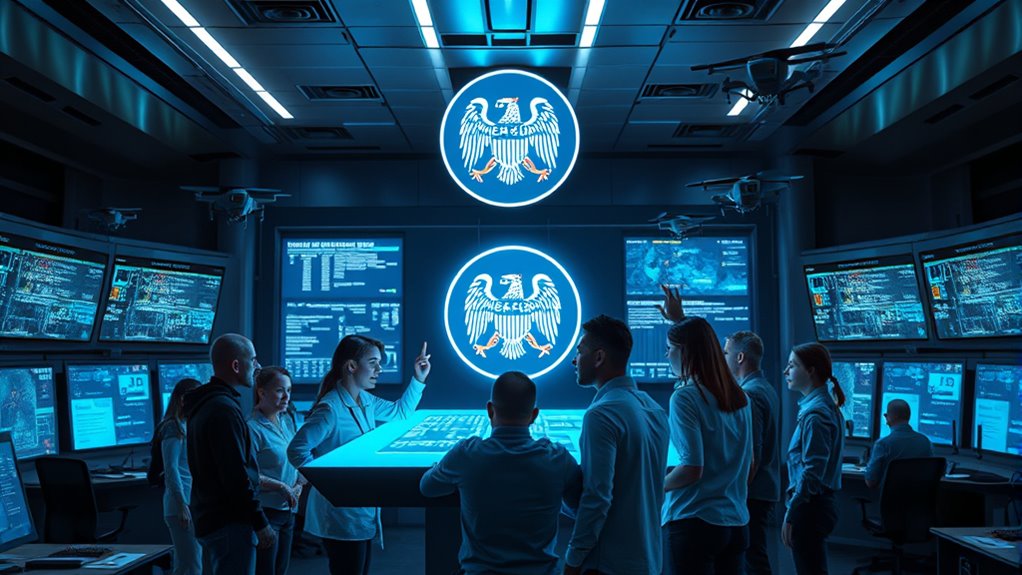
While the CIA innovates with AI to enhance intelligence operations, the NSA focuses on safeguarding these advancements through its AI Security Center.
Established to protect AI systems from malicious attacks, this center aims to secure intellectual property and understand AI's capabilities for national security. Protecting the security of AI systems is crucial as malicious actors continuously evolve their tactics.
The center is dedicated to safeguarding AI systems and securing national security through a deep understanding of AI capabilities.
You'll find it part of the Cybersecurity Collaboration Center, where it develops best practices for AI security.
Collaborating with industry experts and international partners, the center addresses evolving security challenges and provides guidance on deploying AI systems securely.
Its efforts enhance the NSA's ability to counter AI-driven threats, ensuring the confidentiality, integrity, and availability of critical systems.
As AI continues to evolve, so will the center's initiatives and partnerships.
National Security Memorandum on AI
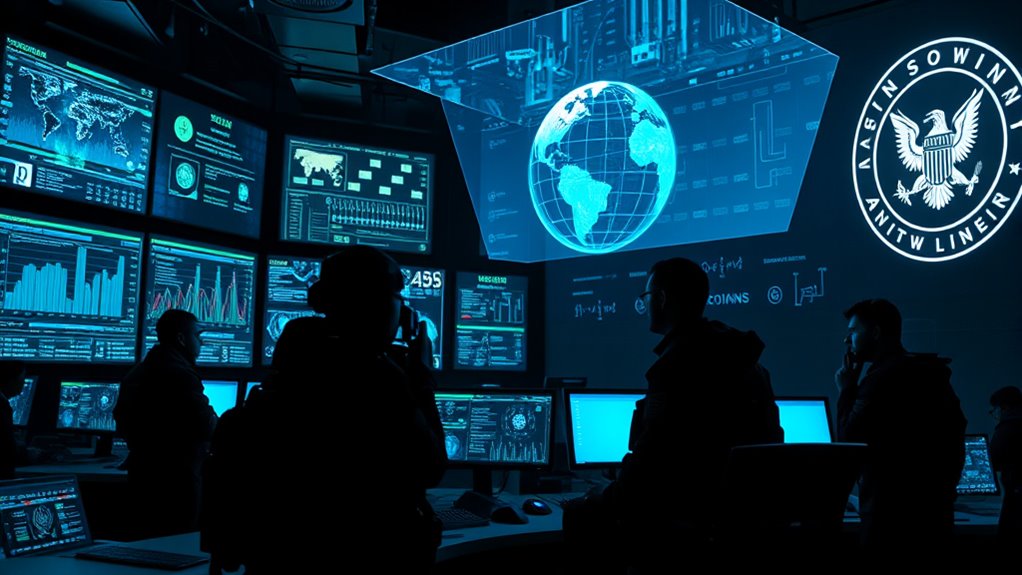
Issued on October 24, 2024, the National Security Memorandum (NSM) on AI is designed to ensure the U.S. remains at the forefront of safe and trustworthy artificial intelligence development.
The NSM aims to harness AI for national security while fostering international partnerships. It emphasizes maintaining U.S. leadership in AI, enhancing cybersecurity measures, and managing risks effectively.
The memorandum includes a classified annex to tackle sensitive national security issues and highlights the importance of securing the AI supply chain.
AI Applications in National Security

With the National Security Memorandum on AI laying the groundwork for innovative applications, intelligence agencies are rapidly integrating AI into their operations.
The National Security Memorandum on AI is driving rapid integration of AI in intelligence operations.
You'll see AI enhancing intelligence analysis by sifting through vast data sets to spot patterns and anomalies, which boosts situational awareness. The NSA leverages AI in surveillance to gather insights on foreign governments, though this raises privacy concerns. Furthermore, the NSA has integrated AI into its daily operations for several years, demonstrating its commitment to adopting advanced technologies.
In cybersecurity, AI tools help identify and mitigate threats, safeguarding national security systems. Additionally, AI supports logistics and command and control, optimizing resource allocation and creating a unified operational picture.
As military capabilities evolve, AI in autonomous systems and weapons enhances effectiveness, while ethical frameworks ensure accountability and transparency in these critical applications.
Cybersecurity Challenges With AI
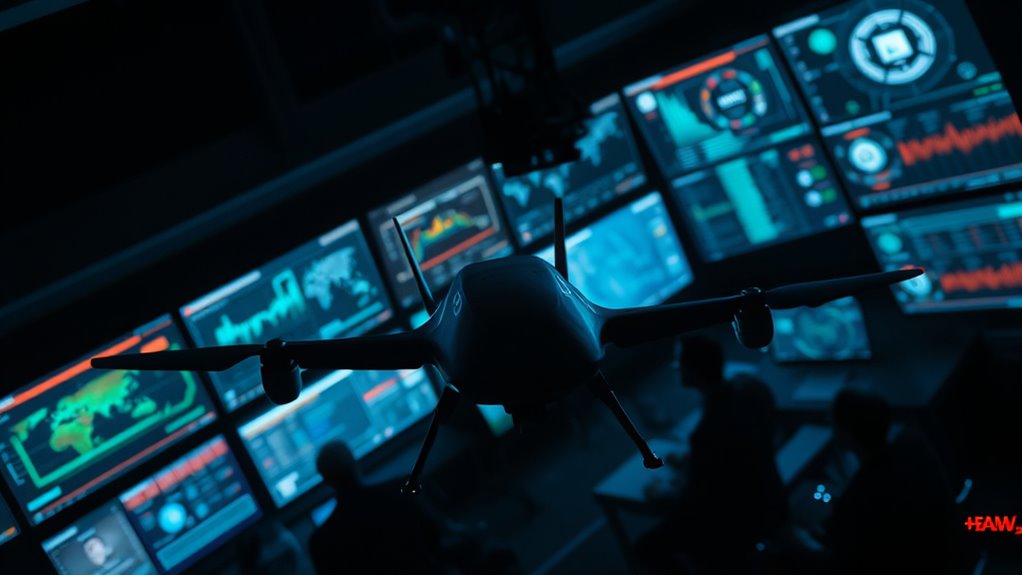
As intelligence agencies increasingly rely on AI for cybersecurity, they face a host of complex challenges that could undermine their efforts.
AI-powered malware can exploit system vulnerabilities, making attacks harder to detect. Deepfake technology deceives individuals and manipulates public opinion, while adversarial attacks can confuse AI systems by altering input data. Additionally, AI-driven defenses are becoming essential to combat the evolving threats posed by advanced malware.
Social engineering becomes more efficient with AI, leading to highly personalized phishing attempts. Moreover, data poisoning can compromise the integrity of AI models.
Implementing AI solutions isn't simple either; they require significant expertise and robust data security. Bias in AI can result in false positives or negatives, complicating threat detection.
Balancing these challenges is crucial to maintaining effective cybersecurity in an increasingly digital world.
Ethical Considerations in AI Use

Cybersecurity challenges highlight the need for ethical considerations in AI use within intelligence agencies. You must ensure that AI complies with legal standards protecting privacy and civil liberties. Transparency is crucial; provide clear insights into AI methods while safeguarding sensitive information. Accountability mechanisms should be in place to determine responsibility for AI outcomes. It's essential to mitigate biases in AI systems, employing fairness measures to create balanced outcomes that reflect diverse perspectives. Upholding user rights and protecting data through robust safeguards is vital. Regular assessments and interdisciplinary governance teams can help adapt to evolving AI capabilities, ensuring ethical practices align with societal values and expectations.
Global Cooperation on AI Standards
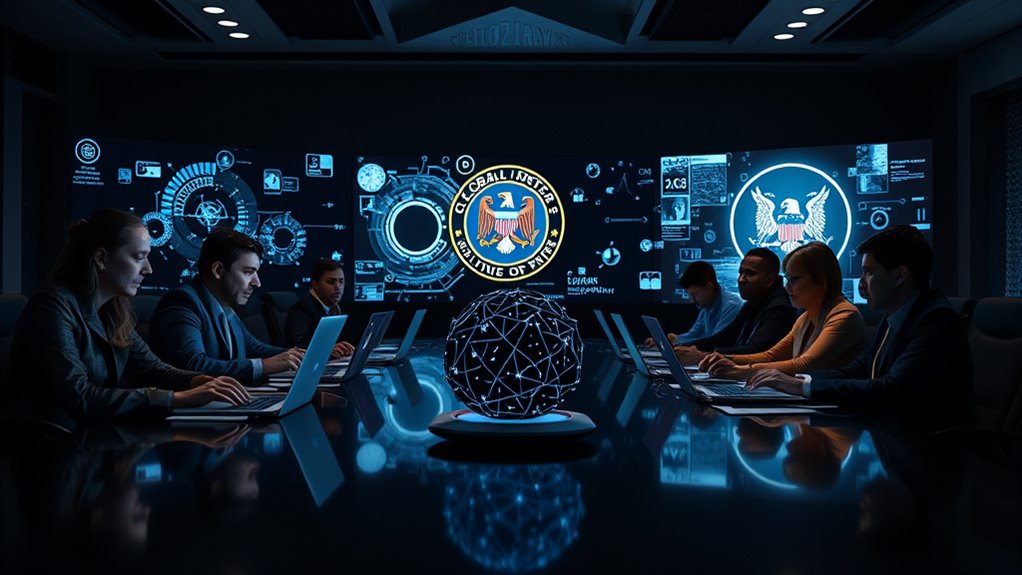
Global cooperation on AI standards is essential for fostering safe and reliable AI systems worldwide. Organizations like ISO and IEC have created joint committees that are actively developing numerous AI standards. Similarly, the IEEE Standards Association has led the way in ethical frameworks for AI since 2015. The ITU and WTO are crucial in promoting international standards that facilitate trade. The G-7's Global Partnership on AI further explores regulatory issues vital for global cooperation. National strategies vary, with the U.S. favoring market-driven standards, while the EU emphasizes transparency. China seeks to align international standards with its interests. Together, these efforts enhance safety, interoperability, and compliance, making it easier for AI technologies to flourish across borders. Technical standards are crucial for managing risks and opportunities related to AI and emerging technologies.
Talent Development in AI for National Security
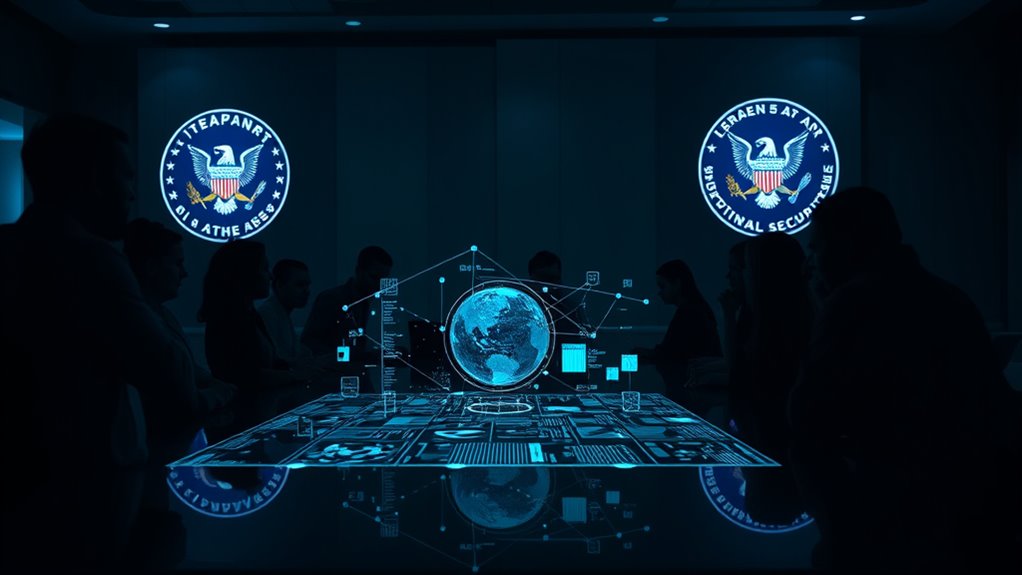
The development of talent in AI is vital for strengthening national security capabilities. To achieve this, the White House is streamlining immigration processes for AI specialists and encouraging agencies to utilize direct hire authorities. Collaborating with industry and academia through scholarship programs enhances recruitment efforts. You'll see a focus on skills-based hiring to ensure personnel possess essential AI competencies. Agencies are tasked with identifying training opportunities within 120 days to boost AI skills. Continuous learning is crucial to keep pace with evolving technologies, as agencies will emphasize the need for U.S. leadership in responsible AI application.
Frequently Asked Questions
How Do AI Systems Affect Privacy Rights in Intelligence Operations?
Imagine your every move being tracked, analyzed, and predicted by AI systems with the power of a thousand eyes!
In intelligence operations, these AI tools can infringe on your privacy rights by gathering immense amounts of personal data, creating detailed profiles, and inferring sensitive information without your consent.
As they become more sophisticated, the risk of bias and opaque decision-making increases, making it vital for ethical frameworks and transparency to safeguard your privacy.
What Specific AI Technologies Are Being Used by the CIA and NSA?
The CIA and NSA utilize various AI technologies to enhance their operations.
You'll find the CIA using AI for content triage, language processing, and generative AI for open-source intelligence. They also deploy chatbots for simulating conversations.
On the other hand, the NSA leverages AI for mass surveillance, cybersecurity threat detection, and analyst monitoring, ensuring efficient data processing and intelligence gathering.
Both agencies embrace AI to streamline their complex tasks and improve effectiveness.
How Is AI Training Conducted for Intelligence Personnel?
Imagine stepping into a world where personalized AI training adapts to your needs, where gamified simulations engage and inspire you, and where real-time chatbots offer guidance.
In intelligence training, you'll experience adaptive learning that evolves with your skill set, curated content that keeps you informed, and predictive analytics that identify your gaps.
This innovative approach ensures you're equipped to tackle challenges as AI transforms data analysis and operational roles within the intelligence community.
Are There Risks of AI Misuse by Intelligence Agencies?
Yes, there're significant risks of AI misuse by intelligence agencies.
You might see surveillance overreach, where personal data gets exploited without consent. AI can also enhance cyberattacks, making phishing and disinformation campaigns more sophisticated and harder to detect.
Furthermore, biases in AI models can lead to discriminatory practices.
Without proper oversight and transparency, the potential for ethical violations increases, raising serious concerns about privacy and civil rights in your everyday life.
What Measures Exist to Ensure Accountability in AI Deployment?
In a world where AI's like a double-edged sword, accountability measures are your shield.
You've got frameworks like NTIA's and NIST's guidelines ensuring transparency and risk management. Independent evaluations and regulatory inspections act as watchful sentinels, safeguarding against misuse.
Voluntary commitments from developers foster trust, while public disclosures illuminate the shadows of AI systems.
As you navigate this landscape, these measures help you hold AI accountable, ensuring it serves as a tool for progress, not peril.
Conclusion
As the CIA and NSA plunge into the AI age, they're not just adapting; they're writing a new chapter in the saga of national security. With innovative initiatives and a focus on ethical use, they're like modern-day Prometheus, harnessing fire for the good of the nation while navigating the shadows of cybersecurity challenges. By fostering global cooperation and nurturing talent, they're ensuring that America remains a beacon of hope in an ever-evolving world of intelligence.


